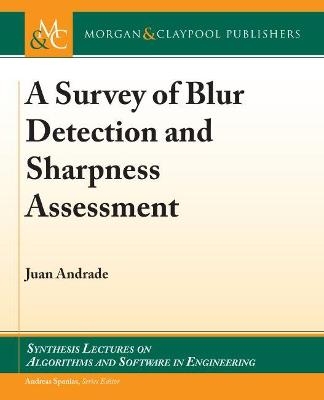
A Survey of Blur Detection and Sharpness Assessment Methods
Seiten
2021
Morgan & Claypool Publishers (Verlag)
978-1-63639-050-5 (ISBN)
Morgan & Claypool Publishers (Verlag)
978-1-63639-050-5 (ISBN)
- Lieferbar
- Versandkostenfrei
- Auch auf Rechnung
- Artikel merken
Blurring is almost an omnipresent effect on natural images.
The main causes of blurring in images include: (a) the existence of objects at different depths within the scene which is known as defocus blur; (b) blurring due to motion either of objects in the scene or the imaging device; and (c) blurring due to atmospheric turbulence.
Automatic estimation of spatially varying sharpness/blurriness has several applications including depth estimation, image quality assessment, information retrieval, image restoration, among others.
There are some cases in which blur is intentionally introduced or enhanced; for example, in artistic photography and cinematography in which blur is intentionally introduced to emphasize a certain image region. Bokeh is a technique that introduces defocus blur with aesthetic purposes. Additionally, in trending applications like augmented and virtual reality usually, blur is introduced in order to provide/enhance depth perception.
Digital images and videos are produced every day in astonishing amounts and the demand for higher quality is constantly rising which creates a need for advanced image quality assessment. Additionally, image quality assessment is important for the performance of image processing algorithms. It has been determined that image noise and artifacts can affect the performance of algorithms such as face detection and recognition, image saliency detection, and video target tracking. Therefore, image quality assessment (IQA) has been a topic of intense research in the fields of image processing and computer vision. Since humans are the end consumers of multimedia signals, subjective quality metrics provide the most reliable results; however, their cost in addition to time requirements makes them unfeasible for practical applications. Thus, objective quality metrics are usually preferred.
The main causes of blurring in images include: (a) the existence of objects at different depths within the scene which is known as defocus blur; (b) blurring due to motion either of objects in the scene or the imaging device; and (c) blurring due to atmospheric turbulence.
Automatic estimation of spatially varying sharpness/blurriness has several applications including depth estimation, image quality assessment, information retrieval, image restoration, among others.
There are some cases in which blur is intentionally introduced or enhanced; for example, in artistic photography and cinematography in which blur is intentionally introduced to emphasize a certain image region. Bokeh is a technique that introduces defocus blur with aesthetic purposes. Additionally, in trending applications like augmented and virtual reality usually, blur is introduced in order to provide/enhance depth perception.
Digital images and videos are produced every day in astonishing amounts and the demand for higher quality is constantly rising which creates a need for advanced image quality assessment. Additionally, image quality assessment is important for the performance of image processing algorithms. It has been determined that image noise and artifacts can affect the performance of algorithms such as face detection and recognition, image saliency detection, and video target tracking. Therefore, image quality assessment (IQA) has been a topic of intense research in the fields of image processing and computer vision. Since humans are the end consumers of multimedia signals, subjective quality metrics provide the most reliable results; however, their cost in addition to time requirements makes them unfeasible for practical applications. Thus, objective quality metrics are usually preferred.
Juan Andrade was born in Cuenca, Ecuador on October 25, 1972. He received his B.Sc. degree in electrical engineering from the University of Cuenca. In 2000, he received a Master's degree in mobile communications from Polytechnic University of Catalonia Barcelona-Spain, and his M.Sc. and Ph.D. from Arizona State University in 2005 and 2019, respectively. He is a professor at the University of Cuenca where he is the director of the school of telecommunication engineering. His current research interests include signal and image processing, computer vision, and image understanding.
Preface
Acknowledgments
Introduction
Out-of-Focus Blur
Image Quality Assessment
No-Reference Image Assessment
Summary and Future Directions
Bibliography
Author's Biography
| Erscheinungsdatum | 05.03.2022 |
|---|---|
| Reihe/Serie | Synthesis Lectures on Algorithms and Software in Engineering |
| Verlagsort | San Rafael |
| Sprache | englisch |
| Maße | 191 x 235 mm |
| Themenwelt | Informatik ► Grafik / Design ► Digitale Bildverarbeitung |
| ISBN-10 | 1-63639-050-1 / 1636390501 |
| ISBN-13 | 978-1-63639-050-5 / 9781636390505 |
| Zustand | Neuware |
| Haben Sie eine Frage zum Produkt? |
Mehr entdecken
aus dem Bereich
aus dem Bereich
Modelle für 3D-Druck und CNC entwerfen
Buch | Softcover (2022)
dpunkt (Verlag)
CHF 48,85
alles zum Drucken, Scannen, Modellieren
Buch | Softcover (2024)
Markt + Technik Verlag
CHF 34,90


